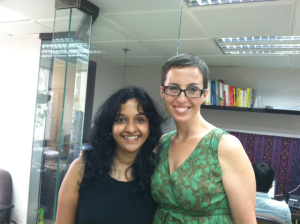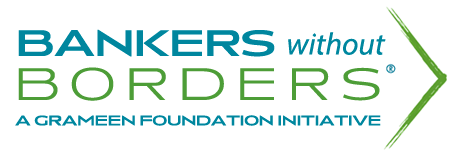Shannon Maynard is Director of Bankers without Borders®, Grameen Foundation’s skilled-volunteer initiative. Maynard has more than 15 years of experience in nonprofit management and volunteer mobilization. Before joining Grameen Foundation, she served as Executive Director of the President’s Council on Service and Civic Participation, and managed strategic initiatives for the Corporation for National and Community Service, a federal agency. This post is the first in a four-part series. The summer after I joined Grameen Foundation to run Bankers without Borders (BwB), I had the pleasure to travel to Shanghai, China, where we had amassed a significant pool of advocates for our work – the “Shanghai Volunteers.” I met with these inaugural members of our BwB community (organized by uber-volunteer Susan Place Everhart) and joined Jennifer Meehan, our Regional CEO for Asia, in meetings with potential corporate partners for Grameen Foundation’s work in the region. After spending time in Shanghai, I then traveled to Bangalore, India, where BwB was undertaking one of its first corporate collaborations and field-based projects in Asia, with Grameen Koota and a team of volunteers from Accenture, Dow Chemical and Citi. It’s now three years later, and I am headed to Hong Kong – Grameen Foundation’s regional headquarters for Asia – to spend time with Sharada Ramanathan, the extraordinary woman behind BwB’s presence today in Asia. Working with Grameen Foundation’s regional staff, we’ll brainstorm how to continue to deeply integrate volunteers into the way Grameen Foundation does business – from helping us fundraise and addressing our own capacity gaps, to creating standard roles for volunteers in delivering our programs and services in Asia. We’ll also look at how we continue to share the skills and expertise of volunteers in our database – more than 20% of whom are based in Asia – with other social enterprises that have a market-based approach to improving the lives of the poor.
 BwB Regional Program Officer for Asia, Sharada Ramanathan (left), and Director Shannon Maynard are spending a week meeting with volunteers and supporters in Hong Kong.
BwB Regional Program Officer for Asia, Sharada Ramanathan (left), and Director Shannon Maynard are spending a week meeting with volunteers and supporters in Hong Kong.
As I prepare for this trip, I think it’s worth reflecting on some of BwB’s successes, failures and insights from our three-year history in Asia.
Let’s start with successes. What has been critical to our success in the region is having someone on the ground in Asia who can effectively build and steward relationships with social enterprises that can benefit from the talent of our volunteer force, while also cultivating a network of companies and associations that can help us attract local volunteers willing to donate their skills pro-bono. Since Sharada joined us in January 2011, we’ve been able to engage more than 140 volunteers on 98 projects with 27 microfinance institutions (MFIs) and other social enterprises in China, Hong Kong, the Philippines, Indonesia, India, Pakistan and Bangladesh. Some of my favorite volunteer projects in Asia include the following:
- As part of the Progress out of Poverty Index® (PPI®) Certification process, volunteers have conducted on-site visits and audits at 14 MFIs to help assess whether they are using this social performance tool in accordance with Grameen Foundation’s defined standards
- Through our Alliance with ACCESS Development Services in India, one of our volunteers helped People’s Forum, a local MFI, to design and launch a new convertible life insurance pension product at three branches, and was ultimately recruited to their Board of Directors
- Our Chinese-translator reserve corps has worked on more than 25 translation projects, ranging from translating technical contracts to training materials
- Volunteers helped danone.communities structure investments in joint ventures that are now bringing clean water to more than 2 million people in India (via Naandi Water Services) and providing 10 million poor Bangladeshis with access to nutritional food products, communication services and daily necessities via the CARE spin-off Jita Project.
Now, the failures. Humbly, I admit that there have been many failures, but in the interest of your time, I’ll share one for now. Early on, I began exploring the potential of creating local volunteer chapters, based in part on the overwhelming interest and desire of our early Shanghai volunteers. Let’s just say that I got in way over my head. Philosophically, chapters make sense – it’s impressive to see what volunteer-led efforts have done for groups like Room to Read and the American Cancer Society. Legally, however, it can be a trickier situation. Local volunteers want to raise funds for local efforts, and China is not an ideal place to pilot a fundraising chapter model. Beyond fundraising, chapters can be useful in generating awareness of your cause and recruiting more volunteers and advocates. In our case, we didn’t necessarily have a lot of ways to engage Shanghai volunteers in volunteer assignments, at the time, in China – in other words, we were creating demand before we had enough supply of opportunities. That said, circumstances have changed and BwB and Grameen Foundation have begun revisiting the potential of local chapters. Recently, I’ve found myself delving back into those “chapter” e-mails and related research files from 2009 to review what we learned from this earlier endeavor. Lastly, insights for the future direction of our work in Asia. Part of the beauty of BwB is that we have a breadth of volunteer talent we can tap into to help worthwhile social enterprises improve their efficiency and effectiveness in achieving their social mission. Our volunteers are specialists (we now have a small army of 8,500+ on hand), while the BwB staff members are generalists – we’re relationship managers, account supervisors and project managers. Our model enables us to be nimble and responsive to the changing needs and opportunities that present themselves. Over the next three years, I hope to see our volunteers add value to regional initiatives that focus on exploring the potential of the mobile phone to further expand financial services to the poor. I also want to see them help microfinance institutions better manage the various dimensions of risk that come with scale, and continue to help social enterprises better measure and manage their social performance by collecting and learning how to analyze client-level data, made possible through tools like the PPI. While I am in Hong Kong this week, I’ll be meeting with many of our local volunteers, as well as new potential corporate partners for our work in Asia. In my next post, I’ll share some of the observations and insights that I glean from these conversations, as well as their suggestions for how BwB can have the greatest effect on improving the lives of the poor in Asia.

